NewsBeat
Starmer and farmers locked in deadlock over tax changes after hundreds of tractors descend on Westminster
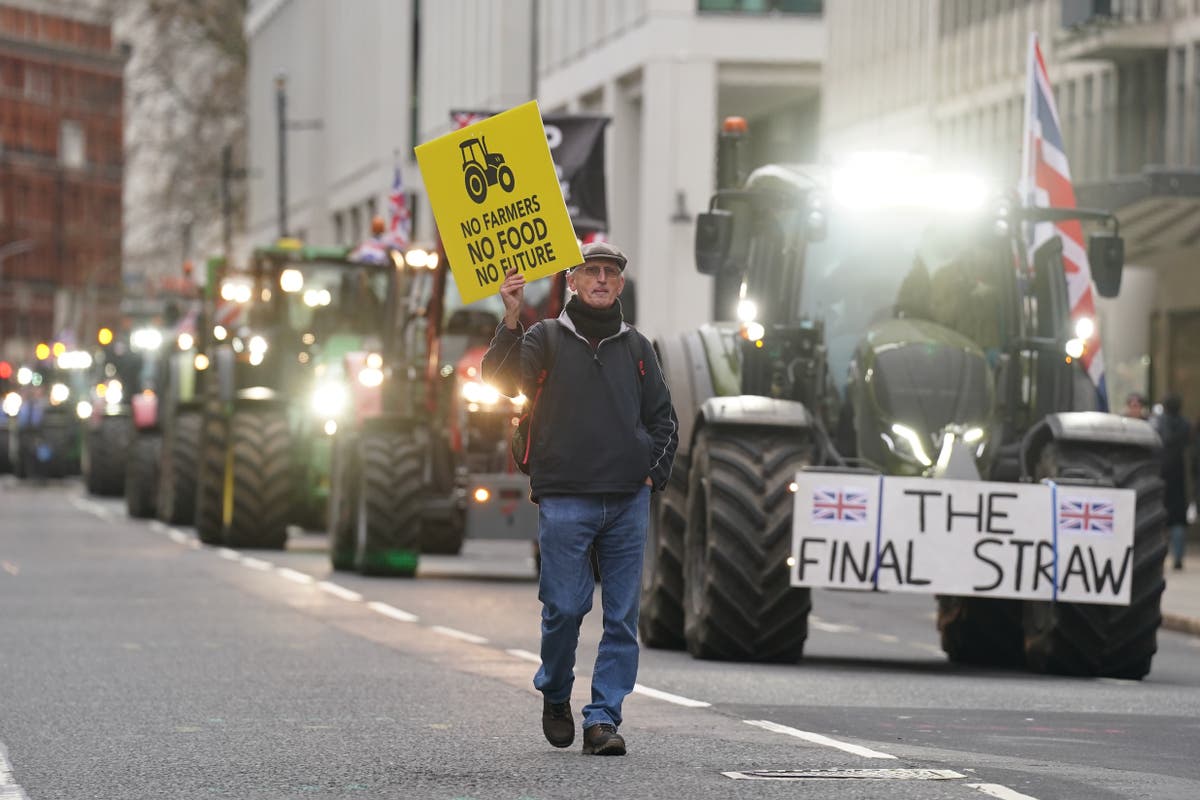
The UK’s farming community and the Labour government remain locked in deadlock after hundreds of angry farmers drove their tractors on Westminster.
On the day a stark report from Defra revealed the UK produced less than two-thirds of its overall food consumed, the countryside arrived in mass outside Parliament to protest over changes to inheritance tax.
National Farmers’ Union (NFU) president Tom Bradshaw fought back tears as he told of the risk of farmers taking their own lives as a result of the levy in an impassioned speech to an Environment Committee.
Outside, an estimated 500 tractors blocked Whitehall before they were driven on a slow and noisy procession around Westminster, displaying banners accusing Sir Keir of destroying the family farm.
However, when confronted over the controversial changes to the levy, which farmers claim will force the sale and even closure of family businesses, Sir Keir remained resolute on his party’s line.

“The vast majority of farmers will be unaffected,” Sir Keir told prime minister’s questions, before accusing opposition political parties of “fearmongering” over the highly sensitive issue.
The NFU said it had attempted to engage with Labour on the plans, which will see farmers pay a 20 per cent inheritance tax rate on farms worth more than £1m from April 2026.
But Mr Bradshaw said there had been no action from the government following a meeting with Sir Keir last month.
Farming campaign groups said the government must back down.
Following Wednesday’s protest in London, leaders said they were already planning more tractor protests in towns and cities where Labour ministers hold parliamentary seats.
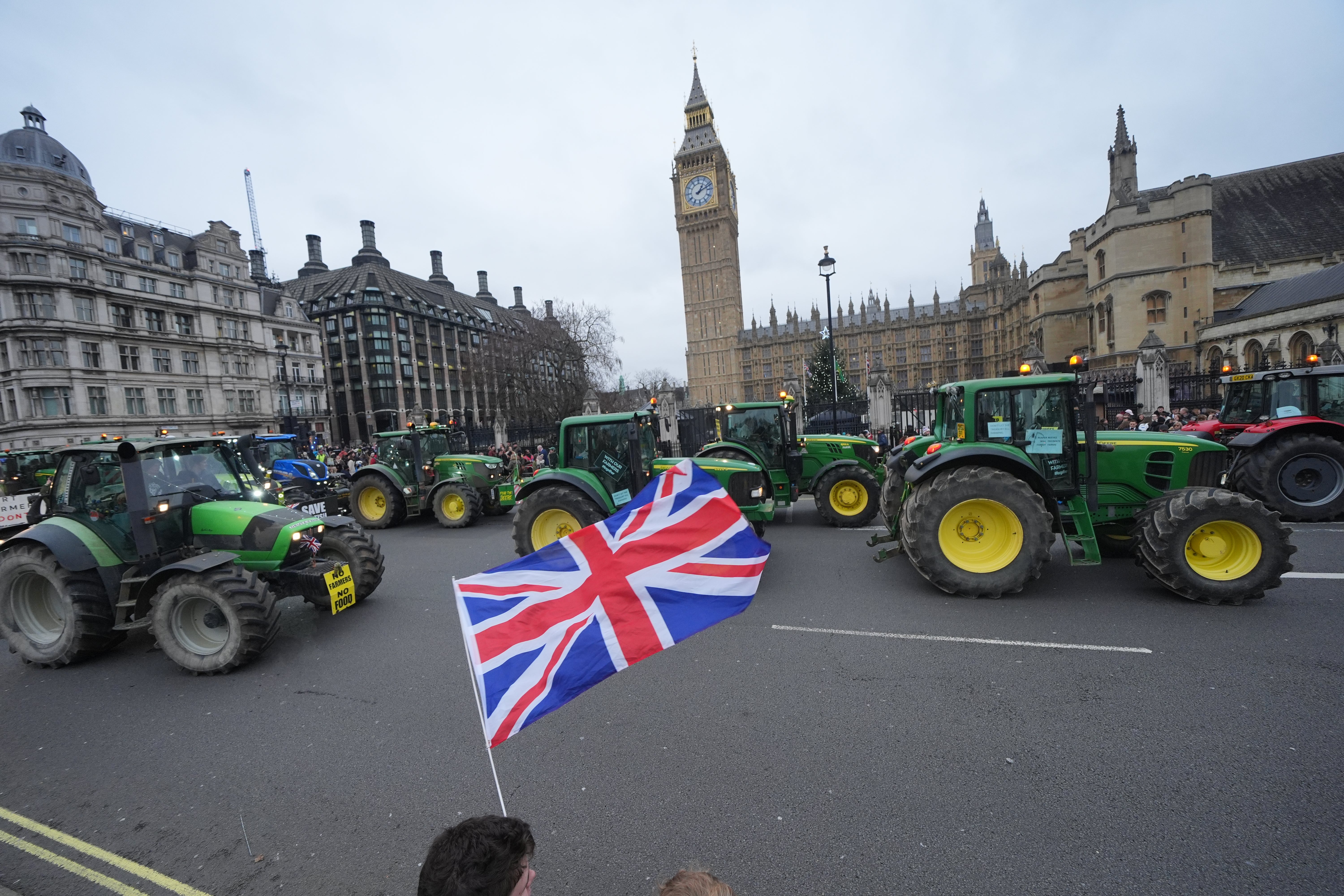
Liz Webster, founder of Save British Farming, told The Independent: “We will fill the towns of every single Labour MP, particularly if they are ministers – they are all on the target list – until the government backs down.”
On speculation of strikes leading to food shortages in supermarkets, Ms Webster refused to rule out the option. “We have not organised anything but we are open to co-ordinating with others, it’s a mass effort,” she said.
Some farmers drove up to eight hours in their tractors from as far away as Exmoor to reach Westminster. The heavy vehicles began rumbling into Whitehall from 10am as the Environment Committee, exploring the impact of the tax changes, started.
As Sir Keir was grilled on the plan at PMQs, first by Lib Dem leader Sir Ed Davey and then Tory MP Jerome Mayhew, the farmers gathered near Downing Street for speeches off the back of a pick-up truck.
An hour later, they got back inside their tractors and took part in a slow procession on a loop route in Westminster.
Waving British flags and sounding their horns, they also displayed signs that read: “No farmers, no food”, “Not hungry, thank a farmer”, and “Save British Farming”.

David Catt, a vegetable and herb farmer from Maidstone in Kent, said the inheritance tax would ruin many family-owned farms.
“These are all generational farmers, so the value of the land they’re working is irrelevant to what they do,” he said. “The trouble is the money you’re getting out of the land does cover the inheritance tax.”
Asked whether further strike action could cause food shortages, Mr Catt said: “We’re trying to get the public on side by doing these public protests. All we’re doing is asking the government to rethink this legislation.

“If we don’t get any change things could escalate up, we could bring the country to a standstill … [but] we don’t want it to come to that.”
Beef and arable farmer Edward Ford, who travelled from Dorking in Surrey, said the tax changes would impact his family.
“I’ve spent the last 30 years increasing and buying land, and I now have quite a large farm for the area,” he said. “I’ve taken no profits knowing we can pass it on.”
His daughter Harriet, 25, is already a partner in the farm, which has been in the family for nearly 100 years. She said: “It’s very uncertain and very unfair, I think it’s just completely unfair.”
Inside the Environment Committee, representatives from farming groups, including Mr Bradshaw, said they had written to Sir Keir asking for a pause in changes to inheritance tax and a consultation.
Mr Bradshaw fought back tears as he warned of the “more severe human impacts” this policy could have, including the risk of farmers taking their own lives.
Addressing arguments that money does not necessarily trigger this response, he became emotional as he said: “It’s not money. This is a lifetime of work, its the heritage and the custodianship of their farm.”
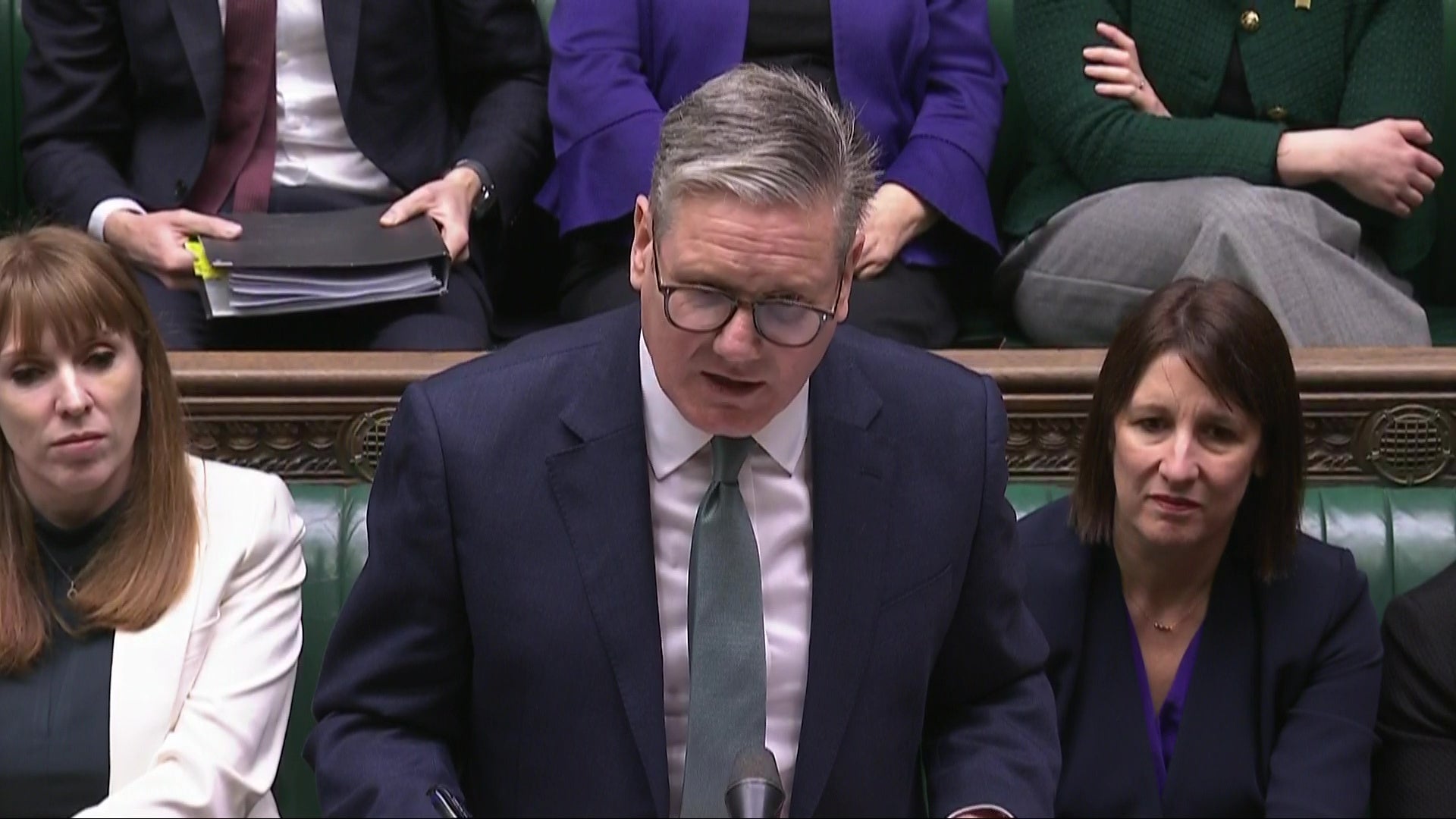
Ms Webster, who helped organise Wednesday’s protest, said: “The responsibility of the farm is everything, so you would feel a failure who ends up losing the farm, and that’s why it is such a cruel act of Starmer to do this, and he’s got to listen.
“It’s just unthinkable that Keir Starmer and his advisers are doing this. It makes Boris Johnson and his Partygate miniscule, this is outrageous. This fight will continue.”
The protest came on the same day the 2024 Food Security Report was published by Defra. It showed, in the UK, of all food consumed, 62 per cent were homegrown, well below the modern-day peak of 78 per cent in 1984.
An argument put forward by farming campaign groups is the phasing out of direct payments, replaced by environment-led subsidies, will push more land away from food production.
They claim that the inheritance tax will further see more farming land sold off as farmers bid to pay the bill.
In the afternoon, Downing Street reiterated the government’s view that only a small number of farmers would be affected by changes.
Asked whether the Prime Minister had a message for farmers who are protesting in Westminster on Wednesday, Sir Keir Starmer’s official spokesman said: “This Government recognises that food security is national security; that’s why we remain steadfast in our support for farmers.”
Asked whether there would be any rethink on inheritance tax, the spokesman added: “No. We have been clear that we understand the strength of feeling about the changes, but we are clear this will only affect a small number of estates.
“Three-quarters of estates will be unaffected by these changes, but the Government’s commitment to farmers is steadfast.”
NewsBeat
Majority of Brits support cutting or abolishing inheritance tax, new poll shows, as farming backlash grows
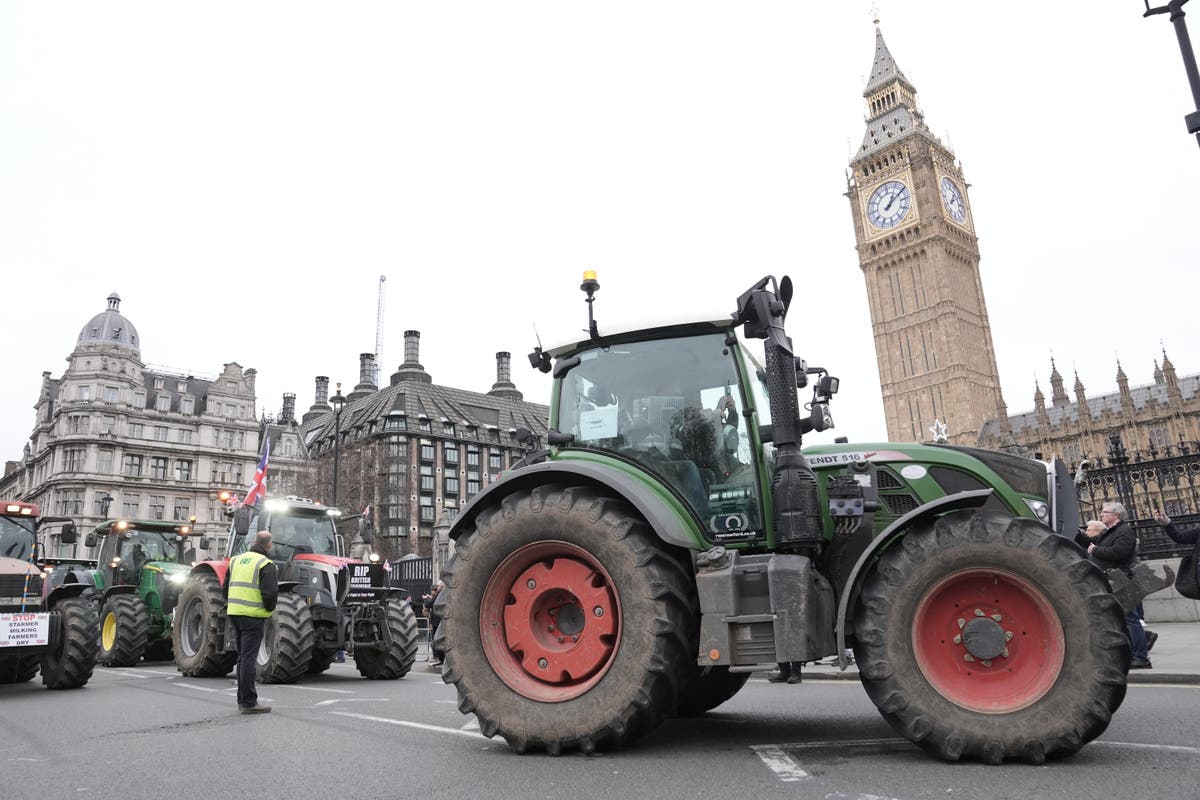
The British public are in favour of cutting or abolishing inheritance tax, a new poll has shown, as backlash over the government’s tax raid on family farms continues to grow.
Campaigners have said the survey should be a “reality check” for the government amid growing frustration over the decision to extend inheritance tax to agricultural properties.
The latest polling, conduced by Public First for the Taxpayers’ Alliance – a pressure group campaigning for a low-tax society – saw 55 per cent of people say they would support cutting or abolishing the tax, with almost half of respondents listing the tax as the most unfair out of a list of nine.

Asked “do you think the government should raise inheritance tax rates, cut inheritance tax rates, keep inheritance tax rates the same, or abolish inheritance tax all together?”, 27 per cent said it should be cut and 28 per cent said it should be abolished.
This compares to 21 per cent who say it should be kept the same and 10 per cent who said it should be increased.
Worryingly for Sir Keir Starmer, the figures were similar for 2024 Labour voters, with 48 per cent calling for the tax to be cut or abolished. Some 39 per cent think it should be kept or raised.
Looking at the question of family farms specifically, 56 per cent of 2024 Labour voters said inheritance tax should not be charged, compared with just 31 per cent who said it should.
John O’Connell, chief executive of the TaxPayers’ Alliance, urged the government to “listen to the electorate that put them in office and scrap inheritance tax”.
“The British public clearly recognise that inheritance tax is an almost uniquely bad tax, given their unanimous support for cutting or abolishing it altogether”, he said.
“While there are certain reforms – such as lifting thresholds – that could ease some of the pain, it’s becoming increasingly clear that the only acceptable solution in the long term is complete abolition.
“Our political leaders now need to listen to the electorate that put them in office and scrap inheritance tax once and for all.”
Meanwhile, Mo Metcalf-Fisher, director of external affairs at the Countryside Alliance said the “damning new polling should serve as a reality check for Keir Starmer and Rachel Reeves who continue to be in denial about the impact this unnecessary and divisive tax hike will have on our family farms”.
“Labour MPs, particularly in rural areas, need to demand a policy rethink now. It would be naïve for them to think this issue and the anger and hurt it has caused will go away”, he said.
On Monday, some of the UK’s largest retailers backed farmers in their fight against Ms Reeves’ inheritance tax raid, warning the “UK’s future food security is at stake”.
The calls have added to pressure on the chancellor to U-turn on her tax raid, which critics warn could sound the death knell for family farms in England.
But Treasury minister James Murray told MPs on Thursday that ministers would not give in to calls to pause and look again. He said the government was “committed to delivering the reforms announced at the Budget”, adding that it was a “fair approach” that would help to fix “the public services we all rely on”.
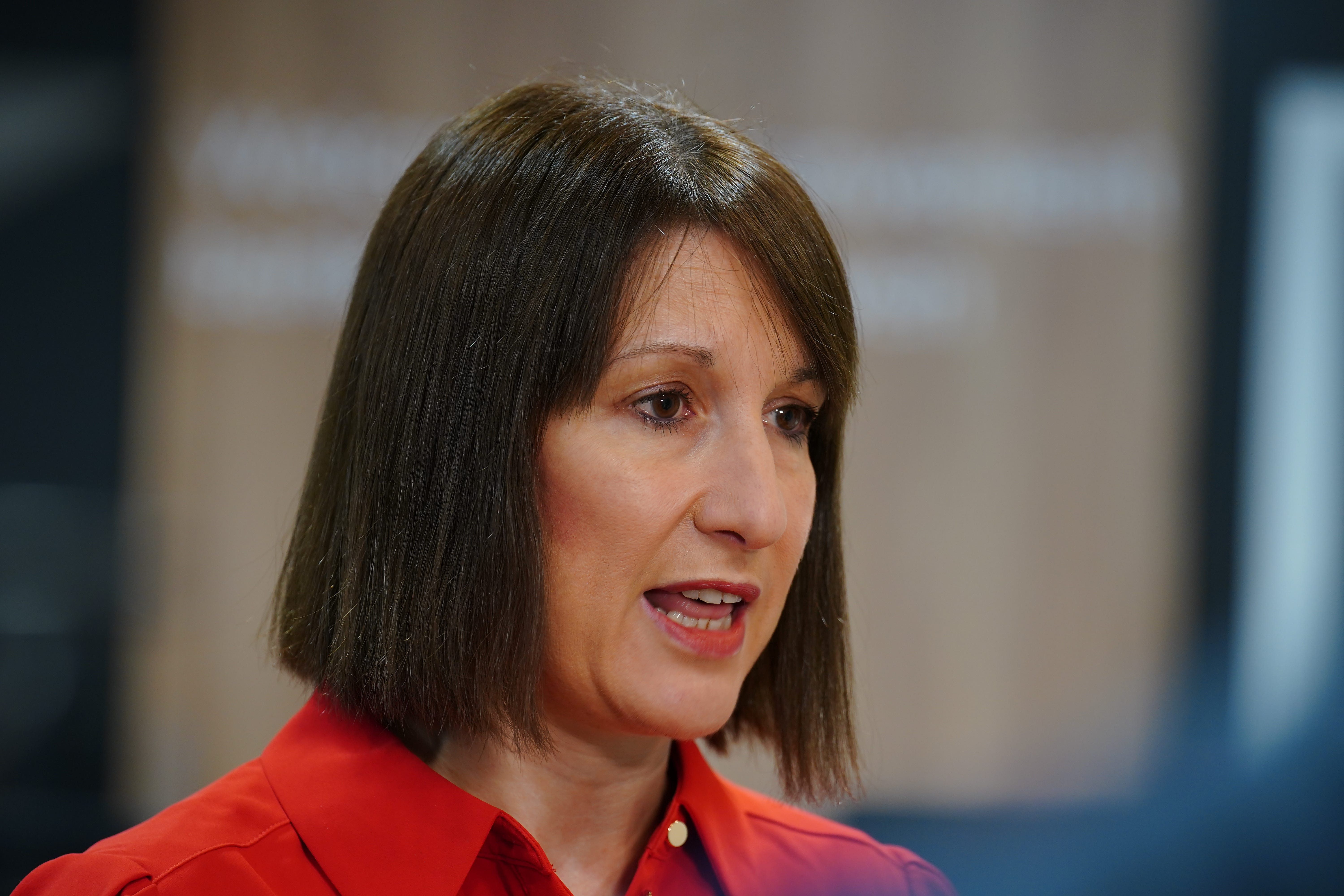
In a separate blow, a new report by the Office for Budget Responsibility (OBR) warned the policy may raise less than the Treasury hopes, with the £500m-a year-revenue forecast given a high uncertainty rating and likely to fall after seven years as families use tax planning to avoid the charge.
The changes mean that farms valued at £1m or more would be liable for 20 per cent inheritance tax.
The Treasury says that, with tax allowances, in reality, only farms worth £3m would be affected, just 28 per cent of family farms. But official Defra figures appear to suggest as many as 66 per cent could be hit.
The polling, which was conducted between December 13 and 17 2024, spoke to 2,011 UK adults.
NewsBeat
Captain Cook statue vandalised in Sydney ahead of Australia Day

Australian police are investigating after a statue of Captain James Cook was covered in red paint and disfigured, ahead of the Australia Day weekend.
It is the second time in 12 months that the statue in Sydney has been vandalised.
Australia Day is a national holiday that is held each year on 26 January – the anniversary of Britain’s First Fleet landing at Sydney Cove in 1788. Many Indigenous Australians say the date causes them pain.
The local council in Randwick – the suburb where the statue is located – described the vandalism as “a disservice to the community and a disservice to reconciliation”.
Councillor Carolyn Martin told Sydney radio station 2GB that the vandals had knocked off one hand and parts of the face and nose.
The statue – which was first unveiled in 1874 – was previously targeted in February last year, when it was covered with red paint and had parts of its sandstone damaged. Works to repair and restore it were completed a month later.
There are several Captain Cook statues across Australia, and others have also been vandalised on or around 26 January.
In 2024, one in Melbourne was cut down on the eve of the holiday, while its plinth was spray-painted with the words “the colony will fall”. Two years earlier the same statue had been splashed with red paint, while in 2018 it was graffitied with the words “no pride” and had an Aboriginal flag placed next to it.
NewsBeat
Councils ‘haemorrhaging funds’ as costs of housing homeless surge

Record levels of homelessness are placing unsustainable pressure on councils’ crumbling finances, an influential committee of MPs has warned as the annual cost of emergency accommodation rose by almost a third.
The booming use of temporary accommodation for homeless families by local authorities has led to a “crisis situation” that must be urgently dealt with across government, a report from the Public Accounts Committee has found.
Some 123,000 households in England are being housed in temporary accommodation, which can include hotels and B&Bs, the latest data from June 2024 showed. The cost to councils of providing this emergency accommodation has risen to £2.1bn for the financial year 2023/24, up from £1.6bn the year before, MPs found.
Sir Geoffrey Clifton-Brown, chair of the committee, said local authorities had been left trying “to save a sinking ship with little more than a leaky bucket”. He warned that councils were “haemorrhaging funds to cover the rising costs of housing families in temporary accommodation”.
The committee called on ministers to come up with a plan to bring down the number of people becoming homeless in the first place, reduce the cost of expensive temporary housing, and fund councils with multi-year commitments.

The number of households facing homelessness exceeded 320,000 between 2023-2024, the highest on record. The rise has been fuelled by a rise in rental costs, coupled with a failure of benefits and pay to keep up with the surging cost of living.
In a report published on Friday, MPs warned government that there was little money left for homelessness prevention, with local authorities focused on funding support for people who are already facing the streets.
MPs said it was “unacceptable” that B&Bs were being routinely used to house people and not as a last resort – warning that children were being put at risk by the precarious accommodation. Data from June 2024 showed that almost 6,000 homeless families with children were being housed in B&Bs, and almost 4,000 families had been there for longer than six weeks.
Due to a lack of affordable housing, councils are also struggling to house families in temporary accommodation in their local area. The number of households placed out of area has risen by a staggering 42 per cent from 2018/19 to 2023/24.
The cross-party group of MPs also said that Local Housing Allowance rates didn’t match rental costs. Some 45 per cent of households now face a shortfall between the housing allowance they receive and the rent they pay, the report found.
Sir Geoffrey Clifton-Brown, a Conservative MP and chair of the committee, said they were “deeply concerned by the number of people currently being housed in sub-standard, overpriced and at times, wholly inappropriate accommodation, sometimes a long way from their previous home.
“A lack of affordable housing, a focus on short-term solutions and no clear strategy to tackle this issue have left us with thousands of families in deeply troubling circumstances.”
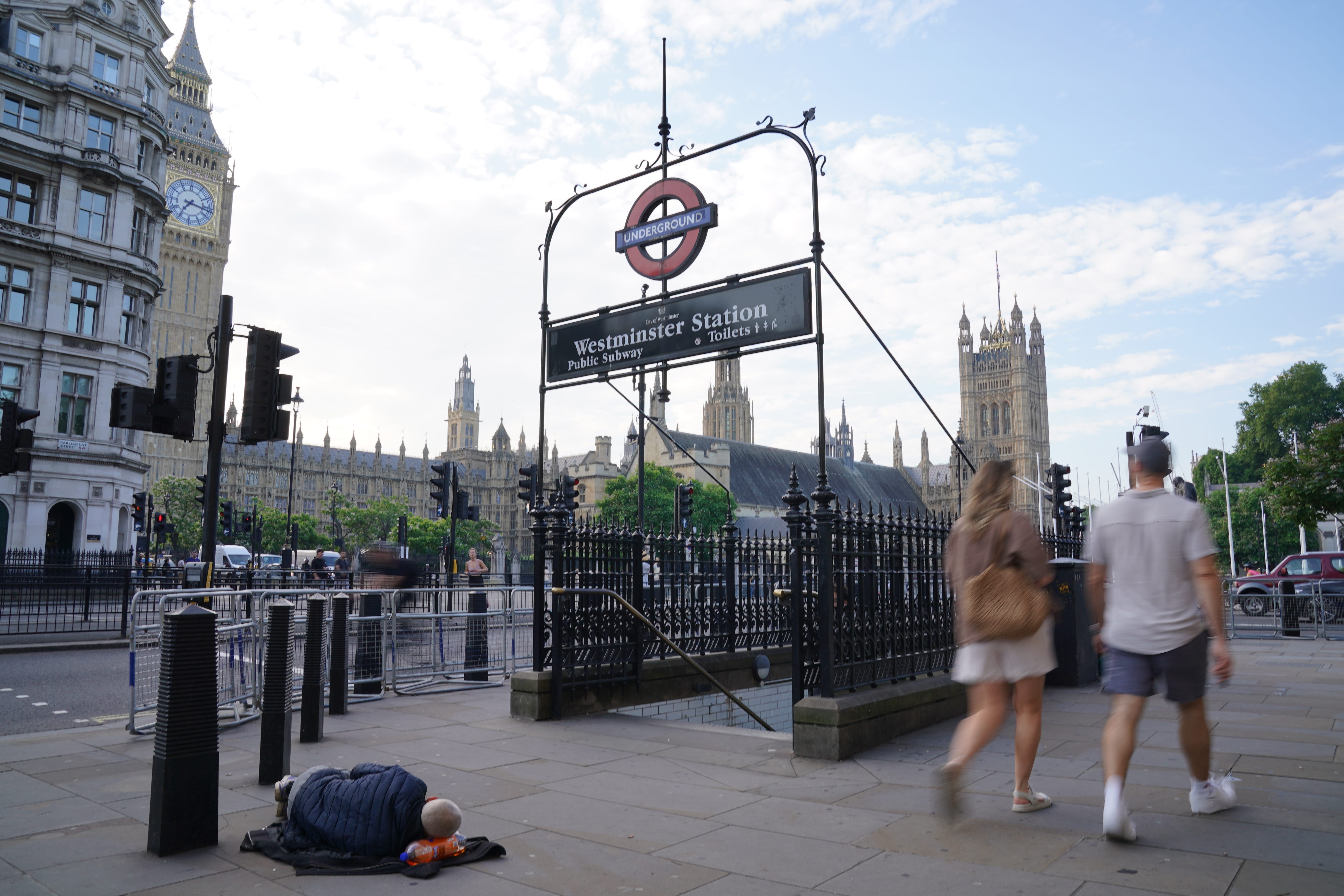
He added: “We are calling for an overarching strategy that addresses the need for better connectivity across government departments to tackle the root causes of this crisis. Without one, we fear this will remain an issue into which money is simply poured, without effectively tackling the blight of homelessness.”
Matt Downie, chief executive of Crisis, said: “Living costs and rent have been skyrocketing, and homelessness increasing. Local councils are stuck between a rock and a hard place, due to limited funds, and the impact on people facing homelessness has been catastrophic.”
Cllr Adam Hug, housing spokesperson for the Local Government Association, said: “Homelessness is one of the biggest and most urgent pressures facing local government. More and more people turn to their council for support and councils have little choice but to resort to costly temporary accommodation, leading local authorities to spend less on funding homelessness prevention.”
A government spokesperson said: “These figures are completely unacceptable and demonstrate the devastating homelessness crisis we have inherited.
“This is why we are taking urgent and decisive action to end homelessness for good, including committing £1bn in additional support for homelessness services and address the use of emergency accommodation.
“We’re talking the root causes of homelessness, committing in our Plan for Change to build 1.5 million new homes, which includes building the social and affordable homes this country needs, and are changing the law to abolish Section 21 ‘no fault’ evictions – immediately tackling one of the leading causes of homelessness.”
NewsBeat
Hair loss drug finasteride ‘biggest mistake of my life’

BBC News
 Kyle
KyleSome online sites are prescribing men a hair loss drug that has potentially risky side effects without consistent safety checks, the BBC has found.
The side effects of finasteride can include suicidal thoughts and impotence, yet some big brand companies will send the pills in the post without seeing or chatting with the customer.
Kyle, who is 26 and from Wakefield, regrets buying the pills online after filling out a ‘tick-box’ form.
He says his life has been turned upside down by an all too quick decision.
 BBC News
BBC NewsKyle started taking finasteride last spring, after it was recommended to him by a mate who was on it.
He says he did a bit of research beforehand, but buying it online was simple.
“I just typed it in on Google and it came up with all these online pharmacies,” Kyle says.
“It’s everywhere. It’s so easily accessible.”
The prescription pills arrived on his doorstep within a week of ordering them.
“I had no consultation with a doctor. No zoom meeting. I didn’t have to send any pictures to them or anything like that to actually make sure I did have male pattern baldness.
“I started it and, yeah – that was the biggest mistake of my life.”
Since taking the drug, Kyle says he’s been having problems with his sexual, mental and physical health – problems he had never experienced before and which have persisted since he stopped the medication.
“Life just feels grey. It’s, like, castrated my emotions,” Kyle says.
“It just stripped everything from me – all my personality and everything. I stopped going out with my mates, stopped playing football and started having all these issues.”
How finasteride works
Finasteride is one of the most common pills for hair loss, taken by tens of thousands of men in the UK. It is only available by private prescription.
It works by stopping testosterone turning into another hormone, called dihydrotestosterone (DHT), that can stop hair growing.
Kyle took it for about six weeks, but stopped after experiencing problems including suicidal thoughts.
 Kyle
KyleIn late April 2024 – just weeks after Kyle got his prescription – UK regulators took urgent action over finasteride, saying packs must contain a special safety alert card warning of the small risk of severe side effects including suicidal thoughts and sexual dysfunction.
After being contacted by other men like Kyle through Your Voice, Your BBC News, we asked a male colleague to buy finasteride from three leading online providers to see what the checks now involved.
Online prescriber ‘Hims’ mentioned the side effects.
Superdrug also offered the option to chat with a doctor – that cost extra.
Only Boots pharmacy asked for a photo of hair loss.
When some packs arrived, none contained the new patient alert card that drug makers were asked to add.
 BBC News, courtesy of Superdrug
BBC News, courtesy of SuperdrugThe Medicines and Healthcare products Regulatory agency says manufacturers have been given up to a year to comply, but it might take longer.
Boots, Hims and Superdrug say online finasteride customers are asked to confirm that they have read and understood the possible risks.
They say until the alert cards are “rolled out” and put in packs, users can read the long patient information leaftlet already included with the medicine to learn about side effects.
The Royal Pharmaceutical Society says online prescribing can be very useful for a lot of patients, particularly if they are too embarrassed to visit a doctor. But the checks must be robust.
James Davies, RPS director for England told BBC News: “It’s really important that regardless of whether it’s online or face to face, these thorough checks are taking place.
“That means that a full medical history is taken, there’s an opportunity to understand the medication that may be prescribed, the side effects, the risks and the benefits.”
He said sharing photos of the hair loss with the prescriber and having a video call to discuss all of the issues could be useful.
The British Association of Hair Restoration Surgery (BAHRS) believes patients shouldn’t get the drug just by filling out an online form.
Greg Williams, hair transplant surgeon and vice president of BAHRS, says although finsasteride is a good treatment for many, the small chance of serious side effects must be explained and closely monitored.
“There will be some patients who have risk factors that might make finasteride a risky prescription. I’m not saying it can’t be prescribed, but patients need to be appropriately counselled.”
Europe’s drug regulator is doing its own safety review of finasteride which could include a ban.
Nearly a year since first ordering the drug, Kyle says he deeply regrets taking finasteride.
“It’s just a little pill. You take it and don’t really think about what it can do to you,” he says.
“Every day I beat myself up saying like ‘You had a perfect life, you didn’t have to risk something over hair’.
“It was vain of me…but when you get insecure you do stupid things.
“If I were made aware of what it can do I never would have took it.”
NewsBeat
Where are the most and least affordable areas to buy a house?

House prices are continuing to grow and mortgage activity has been “surprisingly resilient” despite ongoing affordability challenges, according to a report from Britain’s biggest building society.
Nationwide also found that people working as cleaners, couriers, labourers and in customer service or caring professions could potentially see more than half their take-home pay swallowed up by their mortgage, based on a typical first-time buyer property.
UK housing affordability had seen a modest improvement over the past year, due to earnings growth marginally outpacing house price growth and a slight reduction in average borrowing costs, said Andrew Harvey, a senior economist at Nationwide Building Society.
But, he said, housing affordability remains “stretched” by longer-term standards.
Mr Harvey said: “A prospective buyer earning the average UK income and buying a typical first-time buyer property with a 20 per cent deposit would have a monthly mortgage payment equivalent to 36 per cent of their take-home pay – well above the long-run average of 30 per cent.
“Furthermore, house prices remain high relative to average earnings, with the first-time buyer house price-to-earnings ratio standing at 5.0 at the end of 2024, still far above the long-run average of 3.9.
“Consequently, the deposit hurdle remains high.”
He said the challenge of saving for a deposit has been made worse by record rent rises in recent years and the wider cost-of-living crisis.
In 2023-24, around 40 per cent of first-time buyers had some help raising a deposit, either in the form of a gift or loan from family or friends, or through an inheritance, the report said.
Mr Harvey added: “Despite these affordability challenges, mortgage market activity and house prices proved surprisingly resilient in 2024.
“Annual house price growth ended the year at 4.7 per cent, a marked improvement from the small declines seen at the start of 2024.
“The number of mortgage approvals returned to 2019 levels, despite typical mortgage rates being around three times higher. Perhaps even more remarkably, first-time buyers’ share of house purchase mortgages was actually higher in 2024 (54 per cent) than it was pre-pandemic (51 per cent).
“Looking ahead, providing the economy recovers steadily, as we expect, the underlying pace of housing market activity is likely to continue to strengthen gradually as affordability constraints ease through a combination of modestly lower interest rates and earnings outpacing house price growth.”

The report also looked at housing affordability for people in different professions and found mortgage payments relative to take-home pay are typically lowest for those in managerial and professional roles, where average earnings tend to be higher.
It found that mortgage payments on a typical first-time buyer property would swallow up around a quarter (25.6 per cent) of the take-home pay of managers, directors and senior officials.
However, for people in professional occupations generally, this would increase to 30.9 per cent.
Mortgage payments for those in skilled trades buying a typical first-time buyer property would account for 41.3 per cent of take-home pay, increasing to 43.0 per cent for plant and machine operatives.
For people in admin and secretarial roles it would be 47.2 per cent, for sales and customer service staff, these mortgage payments would represent 51.9 per cent of take-home pay, which is the same for people working in caring and leisure services.
For those working in elementary occupations, including construction and manufacturing labourers, cleaners and couriers, the proportion is 52.0 per cent.
Mr Harvey added that these are “benchmark measures” which use average earnings in each occupational group and the UK typical first-time buyer property price.
He said: “In practice, those in higher paid occupations may choose to buy more expensive properties.”
Mr Harvey added that house price-to-earnings ratios remain broadly similar to a year ago across the UK, with London continuing to have the highest ratio at 8.0 and Scotland the lowest at 3.0.
Nationwide also looked at the most and least affordable local authorities in UK nations and regions.
Here are the least affordable authorities per nation or region, as measured by the typical first-time buyer house price-to-earnings ratio (data is not available for Northern Ireland):
London, Kensington and Chelsea, 13.6
Outer South East, Chichester, 8.5
Outer Metropolitan, Three Rivers, 7.8
South West, Bath and North East Somerset, 7.8
East Anglia, Cambridge, 7.7
Yorkshire and the Humber, York, 6.3
West Midlands, Wychavon, 6.3
East Midlands, Derbyshire Dales, 6.3
North West, Trafford, 6.2
Wales, Cardiff, 5.6
Scotland, Edinburgh, 5.4
North, Westmorland and Furness, 4.4
Here are the most affordable authorities per nation or region, as measured by the typical first-time buyer house price-to-earnings ratio (data is not available for Northern Ireland):
Scotland, Aberdeen, 2.5
North West, Burnley, 2.8
North, Hartlepool, 2.8
Yorkshire and the Humber, North East Lincolnshire, 3.3
Wales, Blaenau Gwent, 3.5
West Midlands, Stoke-on-Trent, 3.7
East Midlands, Chesterfield, 4.1
East Anglia, Great Yarmouth, 4.5
Outer Metropolitan, Surrey Heath, 4.8
Outer South East, Tendring, 5.0
South West, Swindon, 5.3
London, Enfield, 6.2
NewsBeat
‘Bravery’ of Southport girls and calls for justice reform








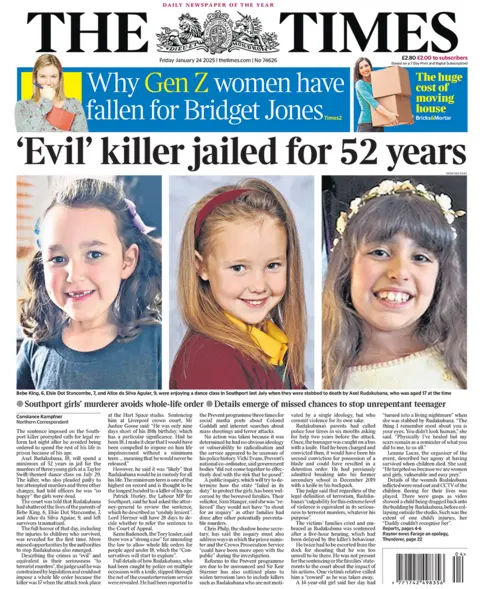




NewsBeat
Stay at home warnings in Scotland and NI over risk-to-life winds
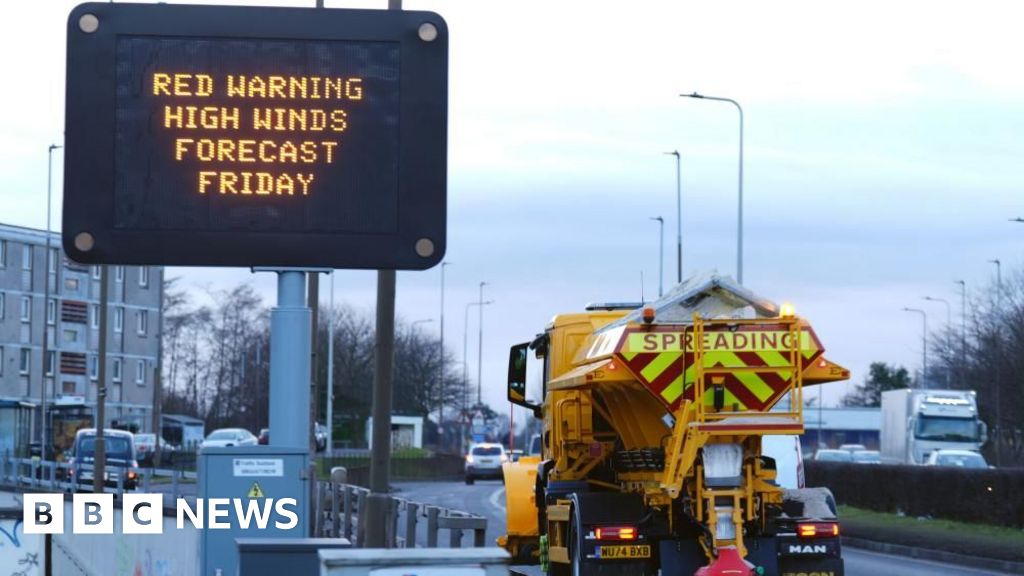
Millions of people have been urged to stay at home on Friday as Storm Éowyn is set to bring potentially life-threatening winds to the north and west of the UK.
Northern Ireland and parts of Scotland are set to experience the worst disruption, where the Met Office has issued red weather warnings which means there is a danger to life from winds gusting at up to 100mph.
Schools will be closed in Northern Ireland and much of central Scotland on Friday, while travel is also expected to be disrupted.
Away from the areas expected to be worst-hit by Storm Éowyn less severe amber and yellow warnings for both wind and rain have been issued, with 11 warnings in place for the UK on Friday and Saturday.
Red is the most serious weather warning the Met Office can issue, meaning dangerous weather is expected and people are urged to take action to keep themselves and others safe.
The red warning for the whole of Northern Ireland will be in force from 07:00 GMT to 14:00 on Friday, affecting the morning rush hour.
Bus and train services have been suspended in the country, while all schools have been advised to close.
In a message to customers, supermarket chain Tesco said all its shops in Northern Ireland would be closed on Friday – adding that home deliveries would be cancelled too.
The Irish Republic’s weather service Met Éireann has also issued severe red weather warnings amid the potential for “hurricane force winds” – with BBC Weather also warning it could be the storm of the century to hit the the country.
The storm is due to move east through Friday morning so a red warning is in place across Scotland’s central belt, including Glasgow and Edinburgh, from 10:00 to 17:00.
Schools in at least 20 local authorities – covering most of central Scotland – will be closed on Friday.
ScotRail has confirmed all rail services in Scotland will be suspended on Friday, adding that the closure was to ensure the safety of customers and staff.
Train operators Avanti, LNER, Lumo, CrossCountry, and Grand Central, TransPennine Express and Northern have also issued warnings not to travel in the north of England and north Wales on Friday.
The AA urged drivers travelling in red weather warning areas to consider whether a journey is necessary, and if not to postpone it.
Across the UK winds will rapidly increase from west to east on Friday morning into the afternoon with peak gusts of 80-90mph (129-145km/h).
There will likely be a large number of trees blown over with widespread disruption to travel with roads badly affected, and flights, trains and ferries will be subject to cancellations.
Power cuts are also likely, some of which could last for a number of days.
NewsBeat
New £9bn deal to build reactors for nuclear submarines will create 1,000 jobs, ministers say

Ministers have announced a new multi-billion pound deal for nuclear submarines they say will create 1,000 jobs and support 4,000 more, as Rachel Reeves scrambles to boost economic growth.
The agreement with Rolls-Royce to support the Royal Navy fleet, dubbed “Unity”, will also aid national security, the government said, days after the UK warned Russia ‘we see you’ as the Royal Navy tracked a Russian spy ship in the English Channel.
Defence secretary John Healey said the investment would “deliver a long-term boost” to British business and jobs.
The government suffered a blow on Thursday with an announcement by Sainsbury’s that it is cutting 3,000 jobs as it braces for a looming surge in costs, including higher taxes and wage bills, following Ms Reeves’s Budget.
Ms Reeves is facing a growing backlash to her plans, including to a hike in employers national insurance. She has also come under increasing pressure after recent figures showed a sluggish economy.

Last week the chancellor warned the rising cost of borrowing and falling value of the pound underlined the need for ministers to go “further and faster” in search of economic growth.
She is expected to use a speech next week to back a controversial third runway at Heathrow, despite deep division within her party over the environmental impact.
Asked about the airport decision while on the trip to the Swiss ski resort, she said that growth, as the government’s primary mission, trumped net zero considerations and was “obviously the most important thing”.
According to the government the new deal for submarines “streamlines previous contracts”, saving taxpayers more than £400 million over eight years.
Steve Carlier, the president of Rolls-Royce Submarines, said the long-term contract “enables us to invest in the right skills, equipment, and facilities to play our part in protecting UK interests at home and overseas.”
Mr Healy said the deal was also a “clear demonstration of our commitment to the UK’s nuclear deterrent, which is our ultimate insurance policy in a more dangerous world.”
The Ministry of Defence said the contract would deliver design, manufacture and support services to nuclear reactors to power the UK’s submarines.
Mr Healey will announce the agreement, worth approximately £9 billion, on a visit to the company’s nuclear production facility in Derby on Friday.
NewsBeat
Russian ships return to Syrian Tartous base ahead of expected withdrawal

BBC Verify
 PA Media
PA MediaTwo Russian ships linked to its military have docked at the Kremlin’s naval base on the Syrian coast at Tartous, with experts suggesting that an anticipated evacuation of the facility has finally begun.
The Sparta and the Sparta II docked in Tartous on Tuesday. Both ships are sanctioned by the US and have been linked by Ukraine to the transportation of Russian arms.
Analysts anticipated that Russia would reduce its military footprint from Syria following the fall of the Assad regime in December – which it supported throughout the civil war.
Large quantities of military hardware have been moved to the port in recent weeks and have been visible in satellite photos analysed by BBC Verify.
The imagery appears to show dozens of vehicles and other equipment sitting at the port. The hardware first appeared in mid-December following footage of large columns of Russian vehicles moving north towards the base – indicating they had been redirected from other outposts across the country.
 Maxar
MaxarThe ships arrival coincides with reports in Syrian media that Russia’s lease for the port has been cancelled. The new transitional government in Damascus refused to confirm the reports to the BBC, while Kremlin spokesperson Dmitry Peskov also declined to comment when asked during a news conference in Moscow.
Tartous has been a key base for Russia in recent years, allowing it to refuel, resupply and repair vessels in the Mediterranean.
The Kremlin has appeared keen to retain control over the base, and said in December that Russian officials were speaking to the new authorities about a continued presence.
Analysts have suggested that the Sparta and the Sparta II – which are ultimately owned by Oboronlogistika LLC – a shipping company which operates as part of the Russian ministry of defence, were denied permission to dock at Tartous while discussions continued. The ships have spent several weeks off the coast of Syria in the Mediterranean Sea.
Marine tracking sites show the ships finally docked on Tuesday evening, after which they switched off their transponders.
The weather in recent days has made it difficult to obtain clear satellite pictures. But images from the EU’s Sentinel radar satellites – which are low resolution but capable of penetrating cloud cover – revealed that the ships were in the military section of the port.

Until now, no Russian military vessels had been spotted at Tartous since the fall of Assad regime in early December. In earlier high-resolution satellite imagery dozens of military vehicles could be seen parked near where the vessels are now docked. Also nearby were cranes which may be used to load equipment.
It is possible that two other Russian naval vessels are also present in the port, naval analyst Frederik Van Lokeren told BBC Verify. He said the vessels, Ivan Gren and the Alexander Otrakovsky, could also be involved in an evacuation – a sentiment echoed by Ukrainian military intelligence to BBC Verify.
“With the 49 year lease being cancelled it has become very clear for Russia that it can no longer hope to maintain a military presence in Tartous and as such, there appears to be no point in staying there and delaying the maritime evacuation any longer,” Mr Van Lokeren added.
The evacuation of all of Russia’s equipment may take some though, according to Anton Mardasov from the Middle East Institute’s Syria programme.
“Over the years much more has been brought in there than these ships and vessels can take,” Mr Mardasov told BBC Verify.
Meanwhile, there has also been continued activity at the main Russian airbase in Syria, Hmeimim. Satellite images have shown large Russian aircraft being loaded with military equipment on various dates since the fall of the Assad regime.
 Maxar
MaxarUkrainian military intelligence said Russia flights had transferred military personnel and equipment from Hmeimim to airbases in Libya at least 10 times since mid-December. The Kremlin is already supporting the Tobruk-based warlord Khalifa Haftar in the east of Libya.
Moscow has long maintained a presence at two of the bases mentioned by Ukrainian intelligence – Al-Khadim and Al-Jufra. A former member of the UN’s working group on mercenaries, Dr Sorcha MacLeod, told BBC Verify that the facilities were previously run by the Wagner Group.
She said that Russia’s defence ministry has taken over responsibility for the bases through its new Africa Corps. The force is run directly by Moscow and has taken over much of the Wagner Group’s former role.
Dr Macleod added that the relocation of Russian forces to the country “makes sense given that Libya has become such a big hub for Africa Corps operations and access into West Africa”.
Additional reporting by Ned Davies and Joshua Cheetham. Graphics by Mesut Ersoz.

NewsBeat
‘You’re a coward’: Inside the courtroom where grieving families refused to be overcome by killer’s antics

Inside Liverpool Crown Court, a tense silence descended as victim’s families gathered in the public gallery, anxiously waiting for Southport killer Axel Rudakubana to enter the dock.
The sentencing hearing, scheduled for 11am, had already started late as police, legal teams, families and journalists had made their way through enhanced security amid heightened tensions over the shocking case.
Every seat was taken, with some choosing to sit in parts of the public gallery with no view of the dock. A piece of frosted glass obscured any chance of catching even a fleeting glimpse of the remorseless killer, described by his own lawyer as having a “total lack of empathy”.
Others, including the grief-stricken parents of Alice da Silva Aguiar, Alexandra and Sergio, had a clear view of the daughter’s murderer.

They watched as Rudakubana, tall and slight, finally entered the glass-screened dock wearing a grey prison-issue tracksuit and a surgical facemask like the one he wore on the day he targeted 26 defenceless girls at a Taylor Swift themed holiday class in Southport last July.
He refused to speak when asked to confirm his identity and sat slumped in the dock with his head bowed accompanied by five dock officers.
The sentencing hearing had come more rapidly than anyone had anticipated. They had all been braced for a harrowing four-week trial which they were spared after the 18-year-old changed his plea without warning on Monday. However, any hope the families had that Rudakubana would accept his punishment with dignity were soon dashed.
Within minutes of prosecutor Deanna Heer KC launching her address, Rudakubana – who had refused to speak entirely at several previous hearings – started to shout over her.
“I need to speak to a paramedic,” he shouted. “I need to speak to paramedic I feel ill.”
Reports published that morning, later contested by police, claimed he had been taken to hospital from prison before the hearing.
Rudakubana’s lawyer Stan Reiz KC revealed prison staff had raised concerns over his wellbeing and his ability “to be in a high-pressure situation”.
“He has not eaten for a number of days and he’s drunk very little over a period of time,” the lawyer said.
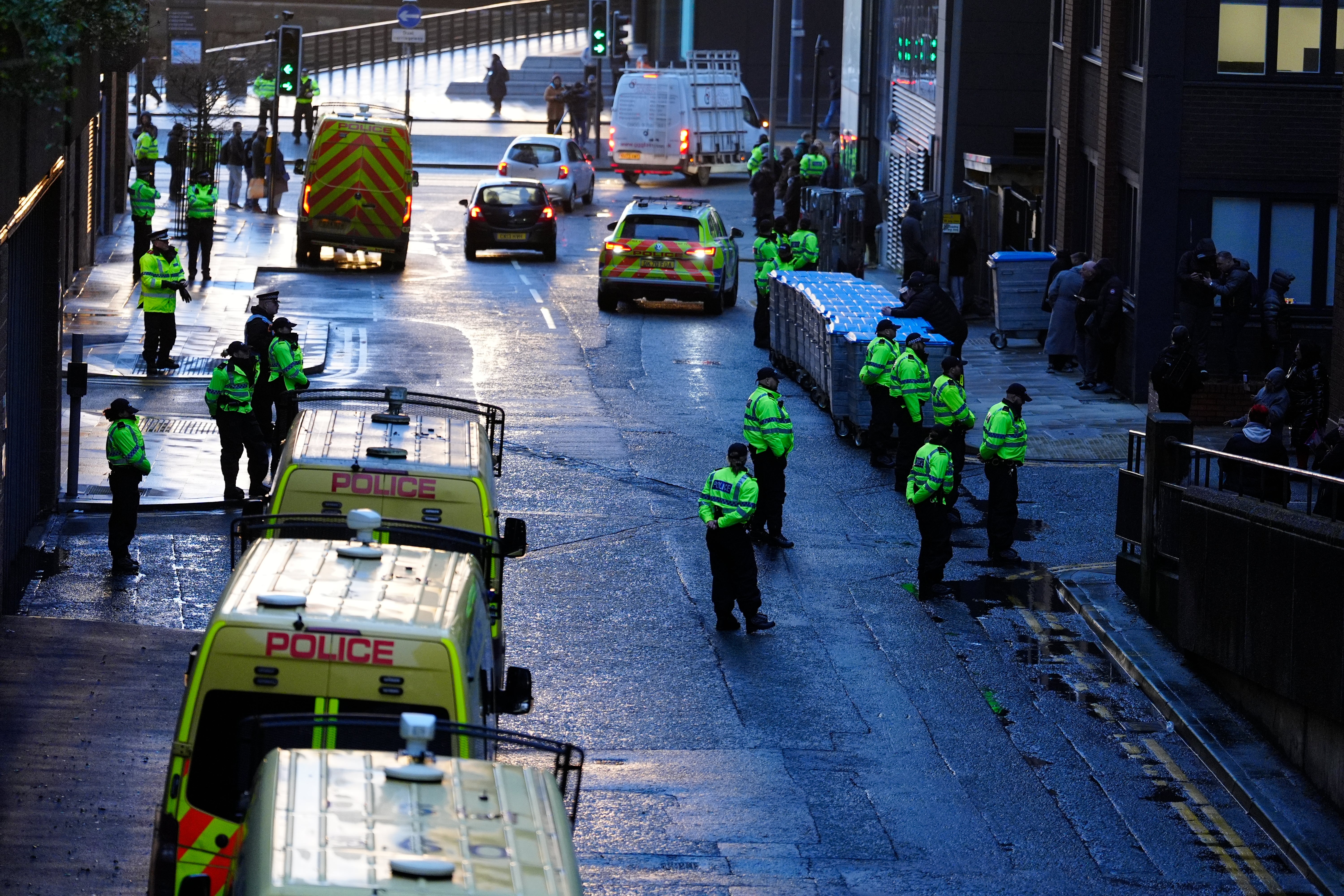
However judge Mr Justice Goose said he had been examined by healthcare professionals before the hearing, who determined he was fit to attend, and told him to stay quiet.
“I can’t remain quiet because I am ill judge,” he protested. “I haven’t eaten for ten days and I’m not going to remain quiet.”
Despite attempts to carry on, he continued to shout over Ms Heer and then told his lawyer he was experiencing chest pains.
The judge, determined to continue, warned him “shouting from the dock is not going to make this happen any quicker”, but the killer refused to stop interrupting. He was ordered from the dock.
A family member shouted “coward” as he was led to the cells by dock officers, while others shook their heads in disgust.
The evidence that followed as Ms Heer recounted the horrifying details of the brutal knife attack was harrowing. Families broke down in the public gallery, with many leaving the court before distressing CCTV footage of the screaming girls fleeing in terror from the knifeman was played.
One clip showed Rudakubana grabbing a girl as she tried to escape and pulling her back into the Hart Space. Moments later, the seven-year-old dressed in summer shorts emerged stumbling and disoriented with visible injuries.
She clung to a wall for a few seconds, looking for her route to safety, but collapsed on the floor. Miraculously, she survived her injuries.
After lunch Rudakubana returned to court, having been seen again by healthcare professionals. He had told his lawyer he would be quiet, but within minutes the interruptions resumed.
“Judge, judge I feel really ill,” he continued. “I need to be seen by a paramedic.”
The judge responded: “He has been seen by a paramedic – two teams of paramedics who deem he’s fit”, before he was ordered from the dock for a second time.

His absence meant he was not in court to listen to a string of devastating victim personal statements, some of which were delivered in person.
One brave survivor, aged just 14, who was stabbed in the back and arm delivered her own victim statement via videolink. She demanded “give me a reason for what you did” as she told her attacker: “I hope you spend your whole life knowing that we think you’re a coward.”
Jailing him life with a minimum of 52 years, Mr Justice Goose said it was highly unlikely Rudakubana would ever be released.
Some family members could be heard to take an audible breath as the sentence was announced. Outside court, they held hands and hugged.
Later, police lined the street as Rudakubana’s prison van was set to leave the court. The killer, who will likely serve his sentence in a maximum security jail, will not be eligible to apply for parole until 2077.
-

 Fashion8 years ago
Fashion8 years agoThese ’90s fashion trends are making a comeback in 2025
-

 Entertainment8 years ago
Entertainment8 years agoThe Season 9 ‘ Game of Thrones’ is here.
-

 Fashion8 years ago
Fashion8 years ago9 spring/summer 2025 fashion trends to know for next season
-

 Entertainment8 years ago
Entertainment8 years agoThe old and New Edition cast comes together to perform You’re Not My Kind of Girl.
-

 Sports8 years ago
Sports8 years agoEthical Hacker: “I’ll Show You Why Google Has Just Shut Down Their Quantum Chip”
-
Business8 years ago
Uber and Lyft are finally available in all of New York State
-
Entertainment8 years ago
Disney’s live-action Aladdin finally finds its stars
-
Sports8 years ago
Steph Curry finally got the contract he deserves from the Warriors
-
Entertainment8 years ago
Mod turns ‘Counter-Strike’ into a ‘Tekken’ clone with fighting chickens
-
Fashion8 years ago
Your comprehensive guide to this fall’s biggest trends








You must be logged in to post a comment Login